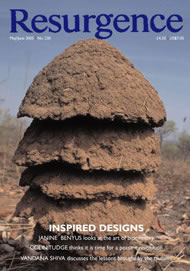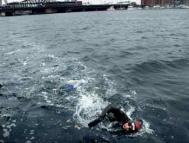ON JUNE 4, 2002, I jumped into the Canadian headwaters of the Columbia River, and took the first strokes that would carry me to the Pacific Ocean. No-one predicted success. I was not rich, I was not a scientist, and I was not a fast swimmer. The biggest obstacle I faced was that I was an average guy. When I overheard Canadians whispering things like "He'll die up North," I just smiled. They saw me for what I was: some guy from Oregon trying to swim the length of one of North America's largest and most inhospitable rivers.
I spent 165 days in the Columbia River. That first day I glided through the mineral water of Columbia Lake, the pristine source of the river. I stretched out my strokes, and tore across water the colour of sky. For the first and last time, I made a point of deliberately swallowing some water.
The next day, I kicked past putting greens of the Fairmont Hot Springs Golf Course, and took my first herbicide bath. Four days later, I swam past my first municipal sewage outfall. But even sewage wasn't all that bad: I knew it when I smelled it. Silicone ear-plugs kept out all but the most determined bacteria. Vaccines closed the door on hepatitis. And activated charcoal tablets put the brakes on diarrhœa. The dangers my Canadian friends had in mind - whirlpools, grizzly bears, rapids and glacial meltwater - were the least of my worries. What kept me up at night were the dangers I couldn't see.
There was no barrier that could protect my nervous system from the neuro-toxic pesticides that washed into the river from the fruit orchards and dry wheat farms that decorate the Columbia River Valley. There was no technology that could get the PCBs out of my fat cells. And there was no protection from the nuclear waste that spiked the waters of the Columbia River's Hanford Reach. (The idea of my swimming past the Hanford Nuclear Reservation in a lead suit was funny, but a nonstarter nonetheless. I swam through the most radioactive piece of land in the Western hemisphere with nothing but a five-millimetre wetsuit between me and the strontium-90, technetium-99, uranium and plutonium that plied the same waters I did.)
All of this begs the question, Why would I risk my life by swimming the Columbia River? The answer was that I loved the river, and I swam in search of a way to help her. And I swam with the knowledge that I was part of the problem. The copper and asbestos dust that shaved off from the brake pads of my SUV sifted into storm drains and fouled salmon-spawning streams. The lights I left on sustained a demand for ecosystem-unfriendly hydropower. And when I flushed my toilet at the height of Portland's rainy winter season, it poured straight into the Willamette and Columbia Rivers.
DURING THE SWIM, I met over 13,000 residents of the Columbia Basin. Everyone I met testified to their affection for the Columbia River. Even folks whose job it was to vent the municipal sewage lagoons into the river spoke of weekends spent fishing, paddling, and water-skiing. This surprised me, and it got me thinking. So often, stakeholders of a waterway spend their time fighting each other. These fights lead to entrenchment, and eventually begin to affect people's identities. Without realising it, folks begin to equate resolving the conflict with risking who they are. They end up clinging to outmoded self-concepts and avoiding solutions, while their shared love for the river becomes a casualty of war.
I knew it didn't have to be this way. And I couldn't help wondering, What if we all acknowledged our love for this river? What if we leveraged the fact that we share so much common ground? Would our shared affection for the river let us put aside our differences long enough to protect every unspoiled section of river? I hoped so, even though I imagined it might be the work of decades.
What could I do to help? Well, I knew I was part of the problem, so I started with some quick fixes. I rode my bike more. I chose a hydropower-free mix of wind and geothermal power from my electricity provider. I shut off the water while I brushed my teeth. The exciting thing was how easy it was to make those changes. The depressing thing was that it took a 1,243-mile swim in cold, dirty water to motivate me at all.
The final frontier for me turned out to be an economic one. For all of my burgeoning awareness, it was a long time before I let myself trace the connection between the money I spent and the river I was swimming. I ate lots of food on the swim. (I had to consume 10,000 calories a day.) For all that, I must admit that most of what I ate was junk. Six hours in the water led to all sorts of cravings. I answered these by powering through bags of Pepperidge Farm Cheddar Cheese Goldfish Crackers, or wolfing down Quarter Pounders with Cheese from McDonald's. In search of the calories I needed in order to swim in thirty-nine-degree water through blizzards, I didn't hesitate. If I wanted a grilled cheese sandwich, I grabbed whichever cheddar cheese was on sale. I didn't waste a thought on the pesticides and antibiotics that I might get along the way.
When I swam past the fruit orchards of central Washington during the pre-emergent pesticide spraying, I finally saw the massive disconnect between my food choices and my clean water message. As I swam past miles of orchards, I was paced by tractors pulling spray rigs that blasted walls of green-yellow pesticides with names like 'Sniper' into the air just yards away. (The average Washington apple orchard receives forty applications of pesticide during the growing season.) Swathed in protective suits and locked inside sealed cabs, the farmers appeared to know the dangers of exposure to these chemicals.
Unfortunately, I took a deep breath of air every third stroke. As the parallel dance of swimming and spraying stretched over a period of two weeks, I began to read the freakish warning labels on barrels of pesticide. But it wasn't until a lymph node in my jaw swelled to the size of a golf ball that I vowed never to eat a conventionally grown apple again.
Suddenly, after what seemed like an impossible level of chemical exposure and denial, I was ready to make a change at the supermarket. Yes, organic fruit and cheese and milk and bread and juice and meat all cost more. But buying conventional versions of these same products now seemed insane. Why would I spend money on neuro-toxic fruit? Why would I support the same chemical companies whose products had made me sick? I wouldn't. But spending the extra money really angered me. Not only that, but I had trouble convincing even close family members to make the change along with me. I struggled to convince my dad to purchase organic milk. In a fatherly tone, he explained, "Chris, some of us don't want to pay five bucks for a carton of milk."
From the beginning I felt frustrated. I remember thinking, "If it takes swimming a contaminated river to get me to buy organic orange juice, what is it going to take the average person?" I never found a great answer, but I started playing with food examples in my public presentations. When folks asked me what they could do for their own creeks and rivers, I said, "Shop for a clean river. Buy organic." When they frowned at such a glib answer, I told them about the pesticides and about my swollen lymph node, and I pointed out that, in the aggregate, their total lifetime food purchases would likely dwarf their charitable contributions to environmental causes. "Look," I would say. "If you pay another dollar for organic butter, you get cross, sure. So why do it? Because you are not just buying butter, you are creating an economic incentive for farmers to stop using the cancer-causing chemicals. That means cleaner creeks, cleaner air, healthier citizens, better wages for labourers, and viable family farms. And lots of you are donating to those causes already." I told them that if I lived to be seventy-seven, and bought $500 of organic food every month, that one broke swimmer would contribute $250,000 to the cause of clean water during that time. People would nod, but I wasn't always sure I had them.
As I read these words, I feel a little sad. Why did it take a life-threatening, year-long journey to awaken me to the power of personal economies? Why couldn't I have convinced myself through study? If I had spent less time in the river and more time at the library, could I have provoked a similar awakening? I fear not. For thirty-three years, the connection between the food I ate and the waters I swam was vague and impersonal. It took swimming a river to wake me up.
Extracted from an article in RootStock (Spring/Summer 2004).
Thanks to the farmers of Organic Valley who sponsored the swim. For more information: www.organicvalley.coop.








